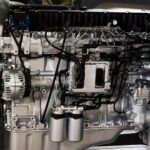Diesel Engine Day is celebrated annually on February 23. Did you know that diesel engines today, power all sorts of things including heavy construction machinery, farm tractors, trucks, marine vessels, buses, and locomotives? They are even turned into power generators at offices, airports, and hospitals. It is simply impossible to imagine our current world without this unique power system, hence the reason why it is more than deserving of its own day.
History of Diesel Engine Day
A diesel engine is an internal-combustion engine in which air is compressed to a sufficiently high temperature to ignite diesel fuel injected into the cylinder, where combustion and expansion actuate a piston. It converts the chemical energy stored in the fuel into mechanical energy, which can be used to power heavy-duty vehicles and machinery, and for electricity generation in hospitals, industrial buildings, and homes.
The invention of this engine is credited to Rudolf Diesel, an engineer, who was granted a patent for the diesel engine on February 23, 1893. He came up with the engine after setting out to improve the efficiency of the Otto engine, a large, single-cylinder, four-stroke engine developed back in the 1870s.
The development of Diesel’s invention took a lot of time and work to become a commercial success. Many engineers and developers joined in the effort to improve the market viability of the idea created by Rudolf Diesel.
Since then, the diesel engine has become a pivotal part of everyday life and transportation. The first commercial engine using Diesel’s patent was installed by Adolphus Busch at his brewery in St. Louis, Missouri. Then, in later years, diesel engines were used to power submarines in WWI and eventually went on to power all military vehicles and equipment in WWII.
Later on, high-speed diesel engines were introduced in the 1920s for commercial vehicle applications and in the 1930s for passenger cars.
Diesel Engine Day timeline
Rudolf Diesel is born in Paris, France.
Diesel sets up his first shop in Paris and begins the development of a compression ignition engine.
Diesel realizes his original cycle will not work and adopts the constant pressure cycle.
The first diesel engine turbochargers and intercoolers are manufactured by Büchi.
Diesel Engine Day FAQs
What inspired Rudolf Diesel?
Diesel drew inspiration from the theoretical works of Nicholas Carnot, a French physicist, which laid the foundations for the principles of today’s modern combustion engine.
Is idling a diesel engine bad?
Letting a diesel engine idle actually does more damage to the engine than starting and stopping. Running it at idle causes twice the wear on internal parts compared to driving at highway speeds.
Why does diesel last longer?
A diesel engine will last much longer than its gasoline counterpart because diesel is a very light oil, and when burnt in an internal combustion engine, basically lubricates the valves, rings, and piston walls.
Diesel Engine Day Activities
Learn about the history of diesel engines
This is a perfect day to learn about the creation of the diesel engine. Read books, watch documentaries, or listen to audiotapes, to gain knowledge.
Drive a diesel engine vehicle
Buy or rent a car, or truck that is powered by a diesel engine and enjoy a fun drive. You’ll notice the difference between it and that of gasoline, and it’ll be worthwhile.
Visit the Museum
Among the museums you can visit on this day are the Internal Fire Museum of Power, Anson Engine Museum, and Deutsches Museum. They’ll offer great insight into the early days of the diesel engine.
5 Facts About Diesel Engines That Will Astonish You
Higher energy density than gasoline
More energy can be extracted from diesel fuel compared with the same volume of gasoline.
It is relatively less expensive to maintain
There is no sparking as it auto-ignites, due to an absence of spark plugs or spark wires, thereby lowering maintenance costs.
It can be boosted
Its performance can be improved with the addition of a turbocharger or aftercooler.
It varies in type
Diesel engines are divided into three main groups, based on power: small, medium, and large with corresponding capacities.
It is relatively safer
Diesel engines do not form a flammable vapor and therefore have a low risk of catching fire.
Why We Love Diesel Engine Day
It is historically relevant
The day reminds us of a very important invention that has now come to influence the way we live and the things we do. It is a very significant historical event.
It highlights the value of innovation
The importance of innovation is showcased and emphasized on this day, and that encourages more people to bring to life new and useful ideas. It is indeed worth being constantly celebrated.
It encourages great thinking
Through the efforts of Rudolf Diesel, the diesel engine was created. This day points people to that fact and encourages us all to think creatively to come up with world-changing discoveries.
Diesel Engine Day dates
| Year | Date | Day |
|---|---|---|
| 2026 | February 23 | Monday |
| 2027 | February 23 | Tuesday |
| 2028 | February 23 | Wednesday |
| 2029 | February 23 | Friday |
| 2030 | February 23 | Saturday |






















